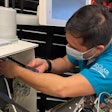A pre-existing mental health issue, a family history of substance abuse, and opioid dependence is the triple threat that can send a physician recovering from substance abuse back into dangerous old habits, according to a study in the Journal of the American Medical Association.
While many rehabilitated physicians do bounce back to their practice, "in our study population, all health care professionals who did not successfully return to medical practice or who died were in the relapse group. Thus even one relapse has poor prognostic significance," wrote Dr. Karen Domino and colleagues. Using 11 years of outcome data from the Washington Physicians Health Program (WPHP), they examined whether those who self-administered potent opioids might be at greater risk for relapse (JAMA, March 23/30, 2005, Vol. 293:12, pp. 1453-1460).
Domino is from the department of anesthesiology at the University of Washington in Seattle. Her co-authors are from the WPHP and Mountain-Whisper-Light Statistical Consulting, both in Seattle.
The study cohort consisted of 292 physicians who were in rehab programs from January 1991 to December 2001. They were followed up through the end of December. Anesthesiologists made up 33% of the group; radiologists accounted for 3%. This relatively low figure may be proportional to the number of U.S. doctors who are radiologists, Domino suggested in an e-mail to AuntMinnie.com. A lack of opportunity could be another factor.
"We don't have definitive information on this, but we suspect that radiologists (other than those doing angiography) may have less access to potent opioids," she wrote. "However, we can't rule out lifestyle issues and other factors."
The drugs of choice for this patient population were divided into fentanyl, other major opioids (morphine), minor opioids (hydrochloride), alcohol, and cocaine. Relapse meant that substance abuse was resumed after the initial diagnosis and after the person had completed a chemical dependency treatment program.
The results showed that 72% of the participants had a family history of a substance use disorder. Alcohol was the substance of choice for most individuals, while opioids were preferred by 14%. Not surprisingly, anesthesiologists were the biggest abusers of fentanyl.
Of the 292 people, 25% (74) had at least one relapse, returning to their initial drug of choice 85% of the time. Most of the relapses were detected by chemical or workplace monitoring. The risk of relapse was almost double when a major opioid was the drug of choice. This was especially true for anesthesiologists -- only five of the 22 fentanyl abusers in this study stayed clean and returned to their same practice. The relapse risk was also nearly doubled by a coexisting psychiatric condition or a family history of substance abuse.
On a more positive note, of the 51 doctors (out of 74) who had a relapse and were followed for five years, more than half (61%) returned to their practice. In some cases, the physicians changed specialties, most commonly to psychiatry and rehab medicine, Domino said.
In an accompanying JAMA editorial, psychiatrist Dr. David Gastfriend from Harvard Medical School in Boston urged medical professionals to look out for one another. If substance abuse is suspected, he suggested calling physician health programs for more specific guidance.
"When physicians, whom society selects for high-level cortical functioning, become alcoholic or addicted, they often manifest exceptionally rationalized denial and sophisticated resistance," Gastfriend wrote. "Referral of an impaired physician is nonpunitive, imperative, and can be lifesaving -- for both patients and the impaired physician" (JAMA, March 23/30, 2005, Vol. 293:12, pp. 1513-1515).
An interesting footnote to this study was that the majority of abusers were seasoned physicians rather than residents or medical students. A common misconception might be that people first starting out in medicine are under more stress and, therefore, more prone to drug abuse.
"Traditionally, people think that substance use with major opioids like fentanyl is more likely during residency years," Domino stated. "However, with drugs such as alcohol and pain pills, older physicians may use these as addiction takes many years to develop. In our study, we had very few residents (only 4%), and most were physicians over 40 years of age (72%). So the risks seem to persist."
By Shalmali Pal
AuntMinnie.com staff writer
March 23, 2005
Related Reading
Heavy social drinkers show brain damage, study finds, April 15, 2004
More medical students favor lifestyle over money, September 3, 2003
Medical students live longer than law, arts, and even divinity students, August 1, 2003
Copyright © 2005 AuntMinnie.com


















